人版高中英语必修三unit1知识点汇总及练习
人教版高一英语必修3-UNIT1知识点详解练习

UNIT 1 Festivals around the worldGrammar:1. Festivals are meant to celebrate important times of year.1) mean v意欲,打算,意味着mean-meaning-meaningful-meaningless考点释义:mean doing sth. 意味着〔必须要做某事或导致种结果〕mean to do sth. 打算或企图做某事mean + that 表示……be meant for=be meant to do sth 被普遍认为是....打算作……用; 为…而有What do you mean by.....你说的.....,.是什么意思.....mean adj.卑鄙的,吝啬的2)celebrate v.庆祝,颂扬,赞扬celebration n.庆祝celebrity n.名人,名声辨析celebrate/congratulatecelebrate+sth.(仪式、典礼、生日),指庆祝令人欢乐的事情或日子congratulate+sb.祝贺某人做某事,congratulate sb. on sth./doing sth(2015武汉二模)The three sisters decided to hold a family party to _______ their parents’silver wedding.A.The other day, we got together to_________ _________ ________ the College Entrance Examination.(祝贺她通过)2. Discuss when they take place, what they celebrate and what people do at that time. take place发生;举行(不能用于进行时态,不能用于被动语态)辨析take place, happen, occur, break out, come abouttake place:发生,举行;经过事先安排的事情happen:偶然发生,带有未能预见的意思。
人教版高中英语必修三Unit1FestivalsandCelebrations知识点梳理(带答案)
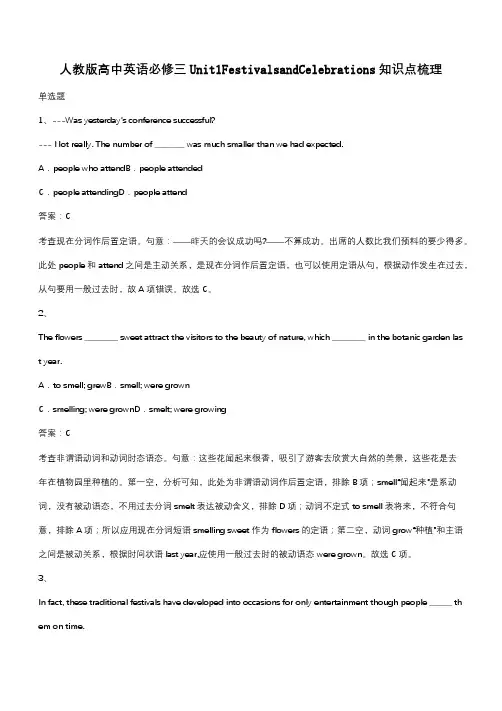
人教版高中英语必修三Unit1FestivalsandCelebrations知识点梳理单选题1、---Was yesterday’s conference successful?--- Not really. The number of ________ was much smaller than we had expected.A.people who attendB.people attendedC.people attendingD.people attend答案:C考查现在分词作后置定语。
句意:——昨天的会议成功吗?——不算成功。
出席的人数比我们预料的要少得多。
此处people和attend之间是主动关系,是现在分词作后置定语,也可以使用定语从句,根据动作发生在过去,从句要用一般过去时,故A项错误。
故选C。
2、The flowers _________ sweet attract the visitors to the beauty of nature, which _________ in the botanic garden last year.A.to smell; grewB.smell; were grownC.smelling; were grownD.smelt; were growing答案:C考查非谓语动词和动词时态语态。
句意:这些花闻起来很香,吸引了游客去欣赏大自然的美景,这些花是去年在植物园里种植的。
第一空,分析可知,此处为非谓语动词作后置定语,排除B项;smell“闻起来”是系动词,没有被动语态,不用过去分词smelt表达被动含义,排除D项;动词不定式 to smell 表将来,不符合句意,排除A项;所以应用现在分词短语 smelling sweet 作为 flowers 的定语;第二空,动词grow“种植”和主语之间是被动关系,根据时间状语last year,应使用一般过去时的被动语态 were grown。
人教高中英语必修三Unit1课本知识点复习
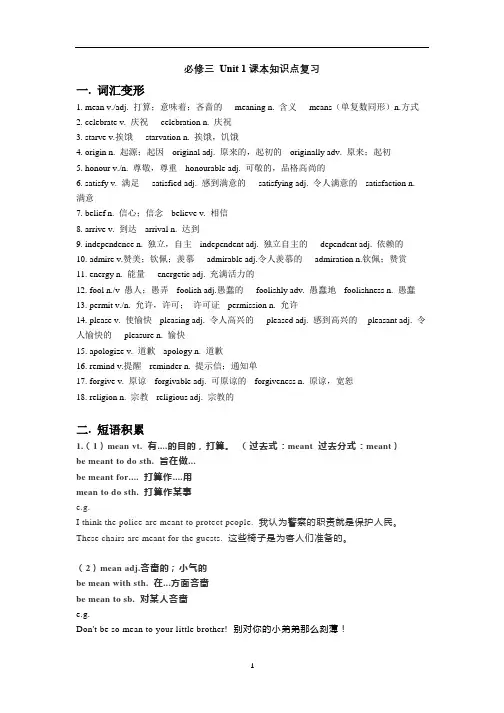
必修三Unit 1课本知识点复习一. 词汇变形1. mean v./adj. 打算;意味着;吝啬的-- meaning n. 含义-- means(单复数同形)n.方式2. celebrate v. 庆祝-- celebration n. 庆祝3. starve v.挨饿-- starvation n. 挨饿,饥饿4. origin n. 起源;起因-- original adj. 原来的,起初的-- originally adv. 原来;起初5. honour v./n. 尊敬,尊重-- honourable adj. 可敬的,品格高尚的6. satisfy v. 满足-- satisfied adj. 感到满意的-- satisfying adj. 令人满意的-- satisfaction n. 满意7. belief n. 信心;信念-- believe v. 相信8. arrive v. 到达-- arrival n. 达到9. independence n. 独立,自主-- independent adj. 独立自主的-- dependent adj. 依赖的10. admire v.赞美;钦佩;羡慕-- admirable adj.令人羡慕的-- admiration n.钦佩;赞赏11. energy n. 能量-- energetic adj. 充满活力的12. fool n./v 愚人;愚弄-- foolish adj.愚蠢的-- foolishly adv. 愚蠢地-- foolishness n. 愚蠢13. permit v./n. 允许,许可;许可证-- permission n. 允许14. please v. 使愉快-- pleasing adj. 令人高兴的-- pleased adj. 感到高兴的--pleasant adj. 令人愉快的-- pleasure n. 愉快15. apologize v. 道歉-- apology n. 道歉16. remind v.提醒-- reminder n. 提示信;通知单17. forgive v. 原谅-- forgivable adj. 可原谅的-- forgiveness n. 原谅,宽恕18. religion n. 宗教-- religious adj. 宗教的二. 短语积累1.(1)mean vt. 有....的目的,打算。
人教版高中英语必修三Unit 1 重难点知识点总结
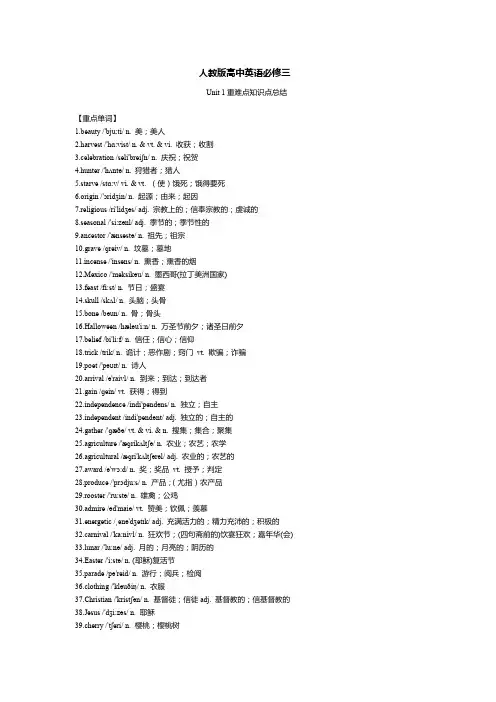
人教版高中英语必修三Unit 1重难点知识点总结【重点单词】1.beauty /'bju:ti/ n. 美;美人2.harvest /'hɑ:vist/ n. & vt. & vi. 收获;收割3.celebration /seli'breiʃn/ n. 庆祝;祝贺4.hunter /'hʌntə/ n. 狩猎者;猎人5.starve /stɑ:v/ vi. & vt. (使)饿死;饿得要死6.origin /'ɔridʒin/ n. 起源;由来;起因7.religious /ri'lidʒəs/ adj. 宗教上的;信奉宗教的;虔诚的8.seasonal /'si:zənl/ adj. 季节的;季节性的9.ancestor /'ænsestə/ n. 祖先;祖宗10.grave /ɡreiv/ n. 坟墓;墓地11.incense /'insens/ n. 熏香;熏香的烟12.Mexico /'meksikəu/ n. 墨西哥(拉丁美洲国家)13.feast /fi:st/ n. 节日;盛宴14.skull /skʌl/ n. 头脑;头骨15.bone /bəun/ n. 骨;骨头16.Halloween /hæləu'i:n/ n. 万圣节前夕;诸圣日前夕17.belief /bi'li:f/ n. 信任;信心;信仰18.trick /trik/ n. 诡计;恶作剧;窍门vt. 欺骗;诈骗19.poet /'pəʊɪt/ n. 诗人20.arrival /ə'raivl/ n. 到来;到达;到达者21.gain /ɡein/ vt. 获得;得到22.independence /indi'pendəns/ n. 独立;自主23.independent /indi'pendənt/ adj. 独立的;自主的24.gather /'ɡæðə/ vt. & vi. & n. 搜集;集合;聚集25.agriculture /'æɡrikʌltʃə/ n. 农业;农艺;农学26.agricultural /æɡri'kʌltʃərəl/ adj. 农业的;农艺的27.award /ə'wɔ:d/ n. 奖;奖品vt. 授予;判定28.produce /'prɔdju:s/ n. 产品;(尤指)农产品29.rooster /'ru:stə/ n. 雄禽;公鸡30.admire /əd'maiə/ vt. 赞美;钦佩;羡慕31.energetic /ˌenə'dʒetɪk/ adj. 充满活力的;精力充沛的;积极的32.carnival /'ka:nivl/ n. 狂欢节;(四句斋前的)饮宴狂欢;嘉年华(会)33.lunar /'lu:nə/ adj. 月的;月亮的;阴历的34.Easter /'i:stə/ n. (耶稣)复活节35.parade /pə'reid/ n. 游行;阅兵;检阅36.clothing /'kləuðiŋ/ n. 衣服37.Christian /'kristʃən/ n. 基督徒;信徒adj. 基督教的;信基督教的38.Jesus /'dʒi:zəs/ n. 耶稣39.cherry /'tʃeri/ n. 樱桃;樱桃树40.blossom /'blɔsəm/ n. 花vi. 开花41.custom /'kʌstəm/ n. 习惯;风俗42.worldwide /'wə:ldwaid/ adj. 遍及全世界的;世界性的43.rosebud /'rəuzbʌd/ n. 玫瑰花蕾44.fool /fu:l/ n. 愚人;白痴;受骗者adj. 傻的vt. 愚弄;欺骗vi. 干傻事;开玩笑45.necessity /ni'sesəti/ n. 必要性;需要46.permission /pə'miʃn/ n. 许可;允许47.prediction /pri'dikʃn/ n. 预言;预报;预告48.fashion /'fæʃn/ n. 样子;方式;时尚49.parking /'pɑ:kiŋ/ n. (汽车等)停放50.apologize /ə'pɔlədʒaiz/ vi. 道歉;辩白51.drown /draun/ vt. & vi. 淹没;溺死;淹死52.sadness /'sædnis/ n. 悲哀;悲伤53.obvious /'ɔbviəs/ adj. 明显的;显而易见的54.wipe /waip/ vt. 擦;揩;擦去55.weave /wi:v/ vt. & vi. (wove/wəuv/,woven/'wəuvn/) 编织;(使)迂回前进56.herd /hə:d/ n. 牧群;兽群57.magpie /'mæɡpai/ n. 喜鹊58.weep /wi:p/ vi. (wept, wept) 哭泣;流泪n. 哭;哭泣59.announcer /ə'naunsə/ n. 广播员;告知者;报幕员60.remind /ri'maind/ vt. 提醒;使想起61.forgive /fə'ɡiv/ vt. (forgave /fə'ɡeiv/, forgiven /fə'ɡivn/ )原谅;饶恕【重点短语】1.mean doing sth. 意味着做某事2.mean to do sth. 打算或企图做某事3.be meant for 打算作……用4.take place 发生;举行5.of all kinds 各种各样的6.starve to death饿死7.be starved of 缺乏8.starve for ... / starve to do... 渴望……9.plenty of 大量; 充足10.be satisfied with对……感到满意11.to one’s satisfaction感到满意是12.in the shape of呈……的形状;以……形式13.in memory of sb./ to the memory of sb. 纪念某人14.dress up 穿衣服;打扮;化装15.award sth.(to sb.) 授予(某人)某物16.award sb. sth.(for ...) (因……)授予某人某物17.reward sb. for... 因……奖赏某人18.reward sb. with sth. 用某物酬劳某人19.admire sb. for... 因……钦佩某人20.look forward to期望,期待,盼望21.turn up 出现;把(收音机等)音量开大些22.turn down 拒绝;把(收音机等)音量开小些23.turn off 关掉24.turn on 打开25.turn out 结果是……26.turn to sb. for help 向某人求助27.keep one’s word 守信28.break one’s word 失信【重点句型】1.Please make sure when and where the accident took place.请查清楚事故是何时何地发生的。
人教版高一英语必修三unit1单元总结复习复习习题练习包括答案
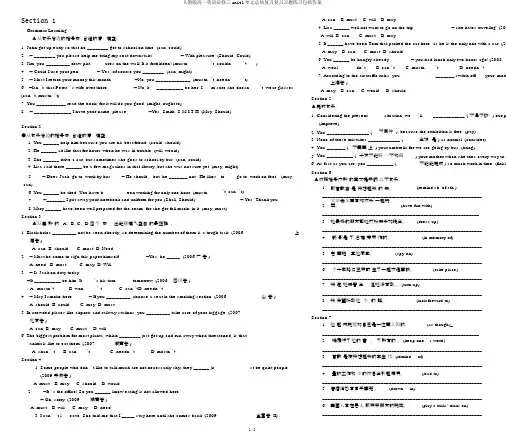
Section 1Grammar Learning▲从句子后边的括号中合适的情填空。
1.John got up early so that he ________ get to school on time. (can, could)2.— ________ you please help me bring my coat downstairs— With pleasure. (Should, Could)3.Jim, you _________ draw pict ures on the wall! It is forbidden! (mustn’t, couldn’t)4.— Could I use your pen— Yes, of course you ________. (can, might)5.— Must I return your money this month—No, you _____________. (mustn ’t, needn’t)6.—Isn ’t that Peter ’s wife over there— No, it__________ be her. I’m sure she doesn’t wear glasses. (can ’t, mustn ’t)7.You ___________ read the book, for it will do you good. (might, ought to)8.— ______________ I have your name, please—Yes, Smith. S-M-I-T-H. (May, Should)Section 2●从句子后边的括号中合适的情填空。
1.You ______ help him because you are his best friend. (could, should)2.He ______ sit like that for hours when he was in trouble. (will, would)3.She ______ drive a car, but sometimes she goes to school by bus. (can, could)4.Lisa said there ______ be a few magazines in that library, but she was not sure yet. (may, might)5.— Does Jack go to work by bus— He should, but he _______ not. He likes to go to work on foot. (may, can)6.You ______ be tired. You have b een working for only one hour. (mustn’t, can ’t)7.—_______ I put away your notebook and uniform for you (Shall, Should)— Yes. Thank you.8.Mary ______ have been well prepared for the exam, for she got full marks in it. (may, must)Section 3▲从每所的 A、 B、C、 D 四个中 , 出能够填入空白的最正确。
人教版高一 英语必修三 unit1 (句型讲解+单词讲解)
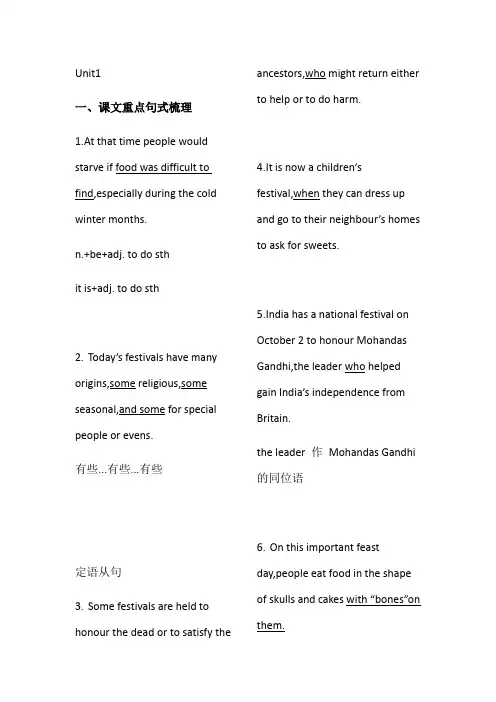
Unit1一、课文重点句式梳理1.At that time people would starve if food was difficult to find,especially during the cold winter months.n.+be+adj. to do sthit is+adj. to do sth2.Today’s festivals have many origins,some religious,some seasonal,and some for special people or evens.有些...有些...有些定语从句3.Some festivals are held to honour the dead or to satisfy the ancestors,who might return either to help or to do harm.4.It is now a children’s festival,when they can dress up and go to their neighbour’s homes to ask for sweets.5.India has a national festival on October 2 to honour Mohandas Gandhi,the leader who helped gain India’s independence from Britain.the leader 作Mohandas Gandhi 的同位语6.On this important feastday,people eat food in the shape of skulls and cakes with “bones”on them.with “bones”on them.是with的复合结构,在句中作定语,修饰其前的cakes.with的复合结构的构成with+宾语+adj.with+宾语+n.with+宾语+adv.with+宾语+介词短语with+宾语+不定式(未发生)with+宾语+现在分词(主动、进行) with+宾语+过去分词(被动、完成)with 的复合结构作状语①表伴随状况She left the office with tears in her eyes.②表示原因With the weather changed,we decided to put off the sports meet.③表示时间The children began to watch TV with the homework done.④表示条件I’d like to see the new film with time permitting.⑤表示方式The boy sat with his head bent.7.The most energetic and important festivals are the ones that look forward to the end of winter and the coming of spring. that引导的定语从句8.The country,covered with cherrytree flowers,looks as though it is covered with pink snow.as though 引导的表语从句过去分词短语作后置定语9.It was obvious that the manager of the coffee shop was waiting for Li Fang to leave.it is obvious that很显然...=it is clear that=it is evident that10.Finding that Zhinu washeart-broken,her grandmother finally decide to let the couple cross the Milky Way to meet once a year.现在分词短语作状语,表原因10.People in China hope that the weather will be fine on that day,because if it is raining,it means that Zhinu is weeping and the couple won’t be able to meet. that 引导的从句二、句子背诵清单下个月我们学校要举行科技周The Science Week will take in (=will be held) our school next month.瑞雪兆丰年A timely snow promises a good harvest.一次成功的庆祝会a successful celebration端午节的由来the origin of the Dragon boat Festival一个宗教的节日a religious festival庆祝冬天的结束celebrate the end of the cold weather满足祖先satisfy the ancestors扫墓和点香clean graves and light incense纪念祖先in memory of the ancestors给逝去的人供奉食物和鲜花offer food and flowers to the dead 在古老的信念中in old beliefs头骨形状的食物food in the shape of skulls 令人难以置信的beyond belief孩子们穿新衣服children dressed in new clothes 打扮成死者的灵魂dress (sb) up as the spirits of the dead people一些商业技巧some tricks of business=some business tricks.骗走某人的钱trick/fool/cheat sb out of their money红包里的压岁钱lucky money in red paper搜集鲜花和食物gather flowers/food为农产品而获奖win/receive awards for the farm produce为他的勇敢而颁奖award him a prize for his bravery赏月吃月饼admire the moon and enjoy mooncakes端午节是在农历十五The Lantern Festival falls on the fifteenth day of the first lunar month一场视觉和听觉的盛宴a feast for our eyes and ears享受生活,暂时忘记工作enjoy life and forget our work for a little while征求某人的许可ask for one’s permission深深吸一口新鲜空气take a deep breath of fresh air 因...向...道歉apologize to sb for sth借酒消愁drown oneself in wine/drink三、词汇派生1.beauty n.美;美人beautiful adj.美丽的beautify vt.美化2.believe v.相信;信任belief n.信任;信心;信仰believable adj.可信的unbelievable adj.难以置信的unbelievably adv.难以置信地3.arrive vi.到达arrival n.到来;到达;到达者4.independence n.独立;自主independentadj.独立的;自主的independentlyadv.独立地;自主地;自力地5.forgive vt.原谅;饶恕forgiveness n.原谅;饶恕forgivable adj.可以宽恕(原谅)的unforgivable adj.不可原谅的四、重点单词梳理1.starvevi. & vt. (使)饿死;(使)挨饿n. starvationstarve to death 饿死starve for sth.渴望得到某物2.gain1)经过努力获得自己渴望的东西gain experience/fame/respect/ love/trust/confidence2). 速度,重量等的增加He gained weight.The plane gained height rapidly.3)(钟表)走快My watch never gains or loses.3 .in memory of为了纪念;追念。
人教版英语必修3 第一单元unit1 book3 词汇 知识点
The language points of Unit1 1. take place 发生;举行(不及物动词)(page1, warming up)take one’s place找某人接替某人的位置in place of代替,用……而不用……in the first place(列举)首先,第一点in the last place最后in one’s place为某人设身处地想一想in place放在原来的位置,就位即学即练:1. 翻译:找到一个代替他的人会很困难。
It would be hard to find a man to__________________.2. take place/ happen/ break out 填空。
The evening party will ___________ on New Year’s Eve.A big earthquake ___________ in Japan.Flu usually ___________ in winter.2. in memory of 纪念;悼念in need/want of __________ in honor of __________in case of __________in praise of __________ in search of __________in charge of __________in possession of __________ in favor of __________即学即练:(1) Many Chinese university provide scholarships for student ____ financial aid.A. in favor ofB. in honor ofC. in face ofD. in need of(2) Some students are against my idea while others ____ it.A. in favor ofB. in memory ofC. in honor ofD. in search of(2) He __________ a thick sweater and rushed out.(3) “He almost __________nothing __________, ” shouted the boy.(4) He always __________an old overcoat.4. trick v. trick sb. into doing sth. 诱使某人做某事 trick sb. out of sth. 骗取某人某物 n. play a trick on sb. = play tricks on sb. 即学即练: (1) The students often __________ (开玩笑) each other after class.(2) He was fed up with ____________________(被取笑).5. gain v. 获得,得到 gain from/by 从……中获得即学即练: 翻译下面句子(1) 从我见过他以后,他长胖了不少。
(完整版)人教版高中英语必修三unit1知识点汇总及练习
必修三复习Unit 1 Festivals around the world单元重点词语 1. take place / happen / occur / come about / break out辨析 2. celebrate / congratulate 3. gather / collect 4. award / reward词汇词部形分变化1. beauty n.美,漂亮;beautiful adj. 美beautify v.美化,变佳人,的,漂亮的美美的东西beautifully adv.美丽地;优美地2. religion n. 宗教 ,崇奉religious adj. 宗教的,忠诚的3. satisfy vt. 知足;使满satisfaction n.满意satisfying adj.令人满意意的 satisfied 感觉满意的4. arrive vi. 抵达,到来arrival n. 抵达 ,到来,抵达者 /物5. depend vi. 依靠 ,信dependent adj依.靠dependence n信.赖,赖, 决定于的,依靠的依靠 independence n.independent独立,自立adj.独立的 ,自主的6. energy n. 活力,精energetic adj. 精力energetically adv. 精力,充足的,充满活力力充足地,踊跃地能源的7. apologize vi. 致歉,apology n. 致歉,认认错错8. sad adj. 悲痛的;十分sadly adv. 悲痛地;sadness n悲.哀;悲糟悲惨地痛;悲惨糕的,令人悲伤遗憾的1.mean (meant, meant) vt.&vi. 意思是;意味着;打算;预约2.starve vi.&vt. ( 使)饿死;饿得要死3.belief n. [c,u] 相信;崇奉;信心重4. gain vt. 获取;获取n.[c,u] 收获;赢利点5. admire vt. 赞叹;敬佩;敬羡单词6.permission n.[u] 赞同;赞同7.remind vt. 提示;使想起8.forgive (forgave, forgiven) vt. 谅解;宽怒1.take place 发生 ;举行2.in memory of 纪念;追忆3.dress up 盛装;妆扮;装修重4. play a trick on 对某人搞恶作剧 /诈骗 /开玩笑点5. look forward to 期望;期望词6. turn up 出现;抵达;发现;调大(音量等 )组7. keep one’ s word守信誉;执行誓言8. hold one’ s breath屏息;屏住气9. set off 出发;起程;使爆炸1. The country is covered with cherry tree flowers so that it looks as 重点句though it might be covered with pink snow.子 2. It was obvious that the manager of the coffee shop was waiting for Li Fang to leave.重点语神态动词的两类重要用法:1.表示推断2.征询建议(见语法部法分)语言重点Ⅰ .词语辨析1. take place / happen / occur / come about / break out【解说】take place表示“发生、举行、举办”,一般指非有时性事件的“发生”,即这类事件的发生必定有某种原由或预先的安排。
2020学年人教版高中英语必修三Unit1知识点归纳总结
2020学年人教版高中英语必修三Unit 1 Festivals around the word二、重点单词突破1 satisfy v.使满意,使满足;满足(需求、需要等)[应试指导]写作高分句式:What satisfied sb.is that...替换to one’s satisfaction他对赢得比赛感到满意。
[夯实基础](1)用satisfy的适当形式填空①None of these is particularly satisfying.②We are not satisfied with these results.③Both sides expressed satisfaction with the progress so far.④We just can’t find enough good second-hand cars to satisfy demands.⑤From his satisfied voice on the phone I know everything is going under way.(2)The teacher was satisfied with his test results and praised him.Satisfied with his test results,the teacher praised him.(用过去分词作状语改写句子)2dress v.给……穿衣;穿着;打扮;n.衣裙;女装;衣服[应试指导]过去分词作定语、状语的考查休穿戴整洁地上班去了。
The boys were all dressed up as pirates.这些男孩子都装扮成了海盗。
[词义辨析]wear,have on,dress,put on(1)wear和have on表示“穿着”的状态,wear同时表示“佩戴”,并可以用于进行时,后还可以跟表示颜色的名词,而have on不行。
2020学年人教版高中英语必修三unit1知识点总结
2020学年人教版高中英语必修三Unit 1 Festivals around the world1.mean doing sth. 意味着mean to do sth. 打算或企图做某事mean sb. to do sth. 打算让某人做某事be meant for 打算作…用2. take place 发生;举行take the place of sb= be in place of sb 替代某人3.of all kinds 各种各样的4..starve to death饿死be starved of sth. 缺乏starve for sth / starve to do 渴望5.be satisfied with感到满意to one’s satisfaction感到满意是...6. in memory of / in honor of . 纪念某人7.do harm to sb. =do sb. harm =be harmful to sb. 伤害某人8.in the shape of呈…的形状9.award sth.(to sb.) =award sb.sth.(for sth.) 给予, 颁奖reward sb. for sth. 因...奖赏某人10.reward sb. with sth. 用某物酬劳某人.dress up打扮,化装11.admire sb. for sth在某方面钦佩某人12.look forward to期望, 期待13.have fun with sb. 玩得开心, 过得快乐=have a good time = enjoy oneself.14.turn up.来, 出现; 把音量开大些15.keep one’s word 守信用16. break one’s word 失信17.set off 动身, 出发; 使(地雷、炸弹)爆炸18. remind sb. of sth. 提醒, 使想起remind sb to do sth 提醒某人做某事19. forgive sb (for) sth 原谅某人某事forgiving adj. 宽容的20.apologize to sb for (doing) sth = make an apology to sb for sth 因某事向某人道歉知识点归纳1. mean 的用法1). mean doing sth. “意味着(必须要做某事或导致种结果)”, 其主语通常是指事物的词。
- 1、下载文档前请自行甄别文档内容的完整性,平台不提供额外的编辑、内容补充、找答案等附加服务。
- 2、"仅部分预览"的文档,不可在线预览部分如存在完整性等问题,可反馈申请退款(可完整预览的文档不适用该条件!)。
- 3、如文档侵犯您的权益,请联系客服反馈,我们会尽快为您处理(人工客服工作时间:9:00-18:30)。
必修三复习Unit 1 Festivals around the world 单元要点语言要点Ⅰ.词语辨析Ⅱ.词性变化Ⅲ.重点词汇1. mean (meant, meant) vt.&vi. 意思是;意味着;打算;预定[典例]1). The sign means that the road is blocked. 这个标志表示此路不通。
2). What do you mean to do with it? 你打算把它怎样处理?3). I mean you to work as our spokesman. 我想请你当我们的代言人。
[重点用法](sth.) mean doing sth. 意味着… (sb) mean to do sth. 打算做… had meant to do sth. 本来打算做某事 be meant for 打算作……用;打算给…(sth.) be meant to do sth. 被预定/指定/认为做某事What do/did you mean by...? “你……是什么意思?”[练习] 按要求填空或翻译。
1). Can you tell me what this sentence______ (mean)?2). Your friendship ______ (mean) a great deal ______ (介词) me.3). In some parts of London, missing a bus means ______ (wait) for another hour.4). What did he mean ______ (介词) saying that remark?5). I ______ ______ ______ ______(本来打算来)yesterday, but I had an unexpected visitor.6). 这些房间是打算用作少年活动中心的。
_____________________________________________________________________2. starve vi.&vt. (使)饿死;饿得要死 starvation n.[u] 饿死[典例]1). The enemy is trying to starve us to death. 敌人正在企图饿死我们。
2). I’ m starving; let’ s have a bi g dinner.我饿得要死了,让我们吃一顿丰盛的晚餐吧。
3). He said he would starve rather than beg for food. 他说他宁愿挨饿也不要饭吃。
[重点用法]starve to death = die of starvation/hunger饿死starve sb to death 把某人饿死starve for sth. = be starved of sth. = hope/long for sth. 希望/渴望得到某物[练习] 用starve的短语的适当形式填空。
1). Thousands of people ________ ________ ________ in Africa.2). These children are ________ ________ love.3). The people on the island _______ _______ _______ fresh water sinceit hadn’t rained for nearly half a year.3. belief n. [c,u] 信任;信仰;信心 believe vt.&vi. 相信[典例]1). He has great belief in his doctor. 他对那位医生无比信赖。
2). She has lost her belief in God. 她已不相信上帝(不相信真有上帝)。
[重点用法]have belief in sth/sb 对某事物/人的真实性和正确性所具有的信心beyond belief 难以置信in the belief that... 相信……It is my belief that... 我相信……[练习] 用belief的短语填空。
1). He came to me ________ ________ ________ ________ I could help him.2). ________ ________ ________ ________ that nuclear weapons are immoral.3). The cruelty of the murders was ________ ________.4. gain vt. 获得;得到 n.[c,u] 收获;获利[典例] 该词有三种含义:1). 表示经过努力一点一点地获得自己渴望的东西He has gained rich experience in these years. 这些年他已获取了丰富的经验。
2). 表示速度、重量等慢慢增加He gained weight after recovery from his illness. 康复后他的体重增加了。
3).(钟,表)走快This clock gains five minutes a day. 这只钟每天快5分钟。
[重点用法]gain experience / fame / independence 获得经验/名望/独立gain sth. from 从……处获得某物gain other’ s respect / love / trust 获得别人的尊敬/爱戴/信任No pains, no gains. 一分耕耘,一分收获。
5. admire vt. 赞美;钦佩;羡慕 admiration n.[u] 钦佩;羡慕[典例]1). I admire your courage and wisdom. 我钦佩你的勇气和智慧。
2). I admired the way she had coped with life. 我钦佩她面对生活的方式。
[重点用法]admire sb. for sth./ doing sth. 在某方面钦佩某人in admiration赞美地/钦佩地[练习] 中译英。
1). 我们都钦佩他的勇气和胆识。
_____________________________________________________________________2). 所有认识他的人都羡慕他取得诺贝尔化学奖。
_____________________________________________________________________3). 我钦佩地看着那小女孩弹钢琴。
_____________________________________________________________________6. permission n.[u] 许可;允许 permit vt.准许;许可;允许permit n.许可(证);执照[典例]You have my permission to leave. 我准你离开。
[重点用法]with/without (one’ s) permission得到允许/未经允许ask sb. for permission 征求某人的许可give sb. permission to do sth.: permit sb. to do sth.允许某人做某事have one’ s permission得到某人的同意[练习] 完成句子或用括号所提供词的适当形式填空。
1). They entered the area _______ _______ (未经允许).2). The prison authorities permit _______ (visit) only once a month.3). We have arranged to play tennis on Saturday, weather _______ (permit).4). You will need to obtain planning _______ (permit) if you want to extend your house.7. remind vt. 提醒;使想起[典例]1). This story reminds me of my childhood. 这个故事让我想起了我的童年。
2). I reminded Gerald of his promise. 我提醒吉罗德他曾许下的诺言。
3). Please remind me to write to my mother tomorrow.请提醒我明天给我母亲写信。
[重点用法]remind sb. of sth. 使某人想起某事remind sb. of / about sth. 提醒某人记住某事remind sb. to do sth. 提醒某人做某事remind sb. that... 提醒某人/使某人想起……[练习] 中译英。
1). 这些照片使我想起我的童年。
_____________________________________________________________________2). 请提醒我要每天服三次药。
_____________________________________________________________________8. forgive (forgave, forgiven) vt. 原谅;饶恕[典例]1). I’ ll never forgive you! 我永远都不会饶恕你!2). He asked us to forgive him for what he had done wrong.他请求我们原谅他的错误。
[重点用法]forgive sb. (for) sth. 原谅某人的某事forgive doing sth. 原谅做某事[练习] 完成句子或用括号所提供词的适当形式填空。
1). I’ ll never ______ ______ _____ _____(因你所说的话而原谅你) you said to me.2). They ______ (forgive) him for his crimes.3). Forgive my _______ (interrupt) you.Ⅳ.重点词组1. take place vi. 发生;举行[典例]1). The football match will take place tomorrow. 足球赛将在明天举行。
